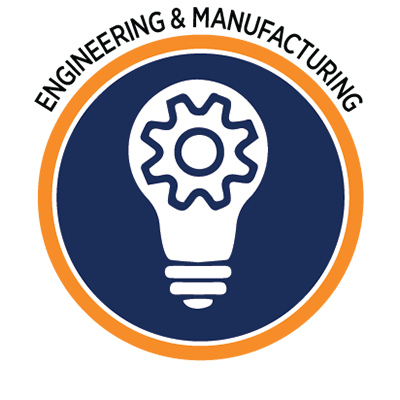Engineering & Manufacturing
Questions? Contact us.
DMACC
Engineering & Manufacturing Pathway
empathway@dmacc.edu
800-362-2127

Engineering & Manufacturing
Innovate, Build, Hands On, Weld
About This Pathway
The Engineering & Manufacturing pathway opens many career options working with your hands and your mind in manufacturing, production, and renewable energy. You could use tools, machinery, and computers in your job to solve problems or invent new products. You could become a welder, machinist, or engineer. Gaining skills for a career in renewable energy or wind turbine technology are also options.
Programs of Study
Advanced Manufacturing Technology
The DMACC Advanced Manufacturing Technology program prepares applicants for a wide variety of manufacturing tasks in industry.
Civil Engineering Technology
The Civil Engineering Technology program prepares the student for a career as a technician in the areas of design, surveying, construction and materials testing.
Computer-Aided Design Technology
Computer-Aided Design (CAD) Technology prepares students for a career in a variety of design and drafting disciplines.
Electronics Engineering Technology
The Electronics Engineering Technology program prepares the student for a career as a technician for installing, maintaining, troubleshooting and repairing electronic systems.
Engineering: Transfer Major AS
This Associate of Science transfer degree is designed for students transferring to Iowa State University or the University of Iowa to study Engineering.
Industrial Technology
The program prepares students for a career as a maintenance technician in a general industrial setting.
- Loading...Industrial Technician, Diploma
- Loading...Basic Electrical, Certificate
- Loading...Basic Electrical, Certificate
- Loading...Basic Pneumatics, Certificate
- Loading...General Industry Safety, Certificate
- Loading...Hydraulic Maintenance, Certificate
- Loading...Industry Tech Logic Controllers, Certificate
- Loading...Maintenance Principles, Certificate
- Loading...Manufacturing and Fabrication, Certificate
- Loading...Measurements & Drawings, Certificate
- Loading...Mechanical Power Transmission, Certificate
- Loading...Motor Controls -Industry Tech, Certificate
- Loading...Sensor and Logic Systems, Certificate
Renewable Energy Technology
The Renewable Energy program provides students conceptual and hands-on training in technology and practices used in the growing fields of mechanical operations and maintenance, wind turbine technology, electrical, electronic and renewable energy.
*This program is currently not accepting new applications
Robotics & Control Systems Engineering Technology
The Robotics & Control Systems Engineering Technology program prepares students for a career as a technician in industrial manufacturing.
Tool & Diemaking
The Tool & Diemaking program prepares students to meet the demands for qualified personnel in either the conventionally controlled or computer numerical-controlled (CNC) tooling industry.
Welding
As described by the American Welding Society, welding is a very sophisticated and technical science, requiring not only mental application but also hands-on abilities.
- Loading...Welding, Diploma
- Loading...Welding, Blueprint Reading, Certificate
- Loading...Welding, Gas Metal Arc, Certificate
- Loading...Welding, Gas Tungsten Arc, Certificate
- Loading...Welding, Production MIG Welding, Certificate
- Loading...Welding, Shielded Metal Arc, Certificate
- Loading...Welding, Thermal Cutting, Certificate
Liberal Arts
Students planning on transferring to a four-year college/university may complete their freshman and sophomore requirements at Des Moines Area Community College.
Nondegree Training
Nondegree classes provide key skills for new and rewarding employment opportunities in targeted career areas.
High School Programming
Thousands of high school students take advantage of DMACC's Career Advantage offerings each year giving them a jump starton their academic and career goals, while saving money on college courses.
Computer-Aided Design Technology, in…
Machine Operation/Tool and Die, in…
Welding, in…
Applied Engineering Technology, in…
Get Involved
Get involved, and join a club. Learn from your peers and make new friends, maybe even find a new passion. There's so much to do besides go to class at DMACC!
- CAD Tech Club
- STEM Club
- Tool & Die Club
- Skills USA
Pathway Success Team
Each Pathway has dedicated and caring experts ready to support your success at every step of your journey at DMACC such as advisors, navigators, and faculty.
Prospective Bears: for help with initial exploration in this pathway and how to apply, contact empathway@dmacc.edu.
Current Bears: for academic, professional, or other support, start by contacting your assigned Academic Advisor.
Award Information
AA: Associate in Arts Degree. An AA is a degree made up of 64 credits you can earn at DMACC with the intent of continuing your education at a 4-year college or university. An AA is a relatively inexpensive way to take care of your general education requirements.
AS: Associate in Science Degree. An AS is also a degree made up of 64 credits you can earn at DMACC with the intent of continuing your education at a 4-year college or university. An AS is a relatively inexpensive way to take care of your general education requirements.
AAS: Associate in Applied Science Degree. An AAS is a degree made up of 64-86 credits you can earn at DMACC that prepares you to be ready to enter the related market or industry.
Certificate: A Certificate of Specialization has a maximum of 48 credits and can typically be completed in 52 weeks that prepares you to be ready to enter the related market or industry. Certificates are not intended to have a general education component.
Diploma: A Diploma has 30-48 credits and can typically be completed in 52 weeks that prepares you to be ready to enter the related market or industry. Diploma’s are primarily discipline specific, with a small amount of general education required.
Nondegree: Continuing education coursework to support your desire to update or learn new skills, advance in your current job, or renew a professional license.
A field of study without any award type listed after the discipline indicates coursework opportunities available at DMACC.